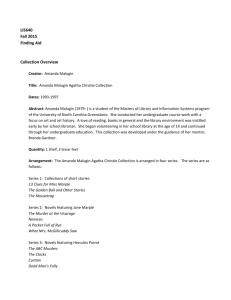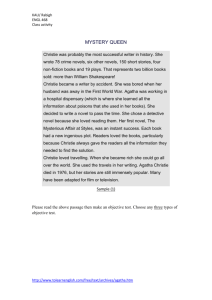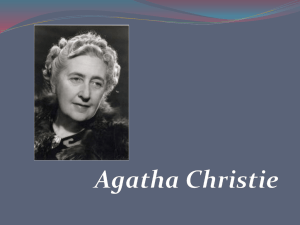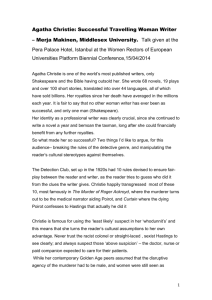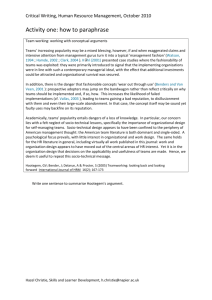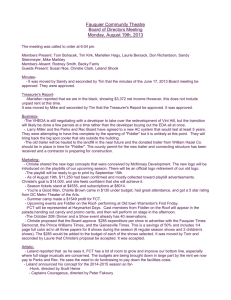Agatha Christie Biography and List of Works
advertisement
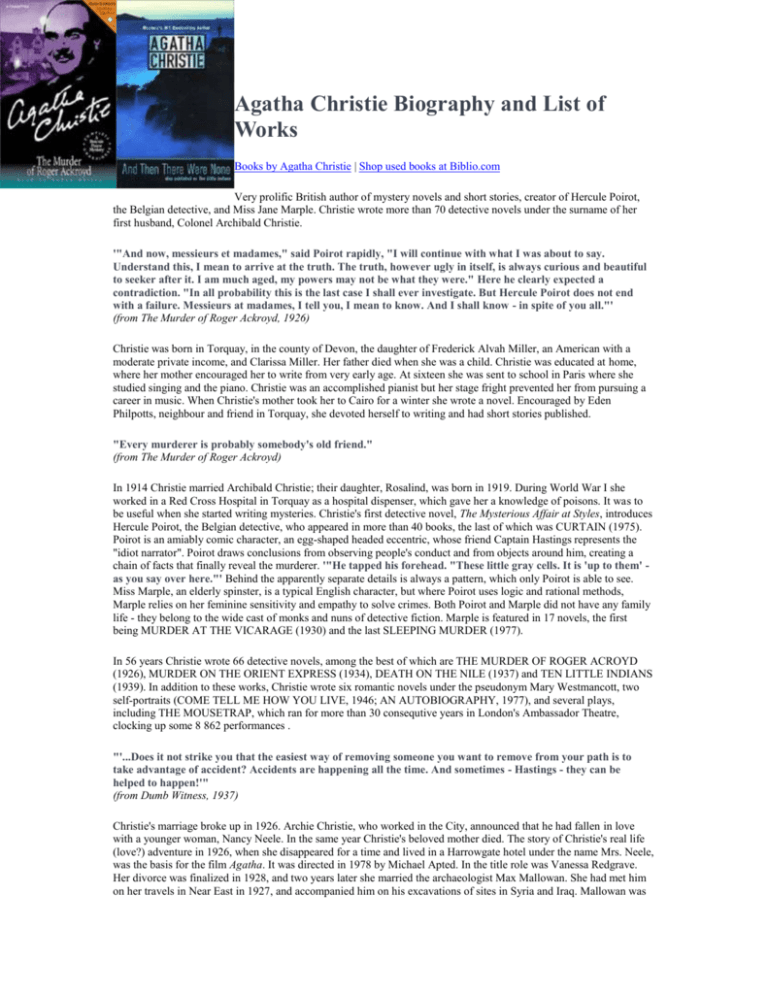
Agatha Christie Biography and List of Works Books by Agatha Christie | Shop used books at Biblio.com Very prolific British author of mystery novels and short stories, creator of Hercule Poirot, the Belgian detective, and Miss Jane Marple. Christie wrote more than 70 detective novels under the surname of her first husband, Colonel Archibald Christie. '"And now, messieurs et madames," said Poirot rapidly, "I will continue with what I was about to say. Understand this, I mean to arrive at the truth. The truth, however ugly in itself, is always curious and beautiful to seeker after it. I am much aged, my powers may not be what they were." Here he clearly expected a contradiction. "In all probability this is the last case I shall ever investigate. But Hercule Poirot does not end with a failure. Messieurs at madames, I tell you, I mean to know. And I shall know - in spite of you all."' (from The Murder of Roger Ackroyd, 1926) Christie was born in Torquay, in the county of Devon, the daughter of Frederick Alvah Miller, an American with a moderate private income, and Clarissa Miller. Her father died when she was a child. Christie was educated at home, where her mother encouraged her to write from very early age. At sixteen she was sent to school in Paris where she studied singing and the piano. Christie was an accomplished pianist but her stage fright prevented her from pursuing a career in music. When Christie's mother took her to Cairo for a winter she wrote a novel. Encouraged by Eden Philpotts, neighbour and friend in Torquay, she devoted herself to writing and had short stories published. "Every murderer is probably somebody's old friend." (from The Murder of Roger Ackroyd) In 1914 Christie married Archibald Christie; their daughter, Rosalind, was born in 1919. During World War I she worked in a Red Cross Hospital in Torquay as a hospital dispenser, which gave her a knowledge of poisons. It was to be useful when she started writing mysteries. Christie's first detective novel, The Mysterious Affair at Styles, introduces Hercule Poirot, the Belgian detective, who appeared in more than 40 books, the last of which was CURTAIN (1975). Poirot is an amiably comic character, an egg-shaped headed eccentric, whose friend Captain Hastings represents the "idiot narrator". Poirot draws conclusions from observing people's conduct and from objects around him, creating a chain of facts that finally reveal the murderer. '"He tapped his forehead. "These little gray cells. It is 'up to them' as you say over here."' Behind the apparently separate details is always a pattern, which only Poirot is able to see. Miss Marple, an elderly spinster, is a typical English character, but where Poirot uses logic and rational methods, Marple relies on her feminine sensitivity and empathy to solve crimes. Both Poirot and Marple did not have any family life - they belong to the wide cast of monks and nuns of detective fiction. Marple is featured in 17 novels, the first being MURDER AT THE VICARAGE (1930) and the last SLEEPING MURDER (1977). In 56 years Christie wrote 66 detective novels, among the best of which are THE MURDER OF ROGER ACROYD (1926), MURDER ON THE ORIENT EXPRESS (1934), DEATH ON THE NILE (1937) and TEN LITTLE INDIANS (1939). In addition to these works, Christie wrote six romantic novels under the pseudonym Mary Westmancott, two self-portraits (COME TELL ME HOW YOU LIVE, 1946; AN AUTOBIOGRAPHY, 1977), and several plays, including THE MOUSETRAP, which ran for more than 30 consequtive years in London's Ambassador Theatre, clocking up some 8 862 performances . "'...Does it not strike you that the easiest way of removing someone you want to remove from your path is to take advantage of accident? Accidents are happening all the time. And sometimes - Hastings - they can be helped to happen!'" (from Dumb Witness, 1937) Christie's marriage broke up in 1926. Archie Christie, who worked in the City, announced that he had fallen in love with a younger woman, Nancy Neele. In the same year Christie's beloved mother died. The story of Christie's real life (love?) adventure in 1926, when she disappeared for a time and lived in a Harrowgate hotel under the name Mrs. Neele, was the basis for the film Agatha. It was directed in 1978 by Michael Apted. In the title role was Vanessa Redgrave. Her divorce was finalized in 1928, and two years later she married the archaeologist Max Mallowan. She had met him on her travels in Near East in 1927, and accompanied him on his excavations of sites in Syria and Iraq. Mallowan was Catholic and fourteen years her junior; he became one of the most prominent archaeologist of his generation. Of her marriage the writer told reporters: "An archaeologist is the best husband any woman can have. The older she gets, the more interested he is in her." Christie's most prolific period began in the late 1920s. During the 1930s she published four non-series mystery novels, fourteen Poirot novels, two Marple novels, two Superintendent Battle books, a book of stories featuring Harley Quin and another featuring Mr. Parken Pyne, an additional Maru Westmacott book, and two original plays. During WW II Christie worked in the dispensary of University College Hospital in London. After the war she continued to write prolifically, also gaining success on the stage and in the cinema. Witness for the Prosecution, for example, was chosen the best foreign play of the 1954-55 season by the New York Drama Critics Circle. Among the many film adaptations were Murder on the Orient Express (1974), with Albert Finney as Poirot, and Death on the Nile (1978), with Peter Ustinov as Poirot. (see list below) Christie's characters are usually well-to-do people. Often the comfortable lifestyle of her characters is undermined by financial problems, which lead to murder. Coziness is deceptive and in many stories the reader is made to suspect an innocent character. Christie's world- view is conservative, which is also seen in her emphasis on logical explanation of crimes - there is no anarchy in Christie's world and society is not blamed for the crimes committed. "Miss Lyall's hobby in life, as has been said, was the study of human beings. Unlike most English people, she was capable of speaking to strangers on sight instead of allowing four days to a week to elapse before making the first cautious advance as is the customary British habit." (from 'Trinagle at Rhodes' in Murder in the Mews, 1937) In 1967 Christie became president of the British Detection Club, and in 1971 she was made a Dame of the British Empire. Christie died on January 12, 1976 in Wallingford, Oxforshire. With over one hundred novels and 103 translations into foreign languages, Christie was by the time of her death the best-selling English novelist of all time. As Margery Allingham said: Christie has "entertained more people for more hours at time that any other writer of her generation." (New York Times Book Review, 1950) See also: "Great Ladies" of the English mystery's golden age; Margery Allingham, Dorothy L. Sayers, Ngaio Marsh Latest posthumously published novel: Black Coffee (1998) - originally play, which was produced in 1930 and later filmed. Adapted from the play by Charles Osborne. Hercule Poirot solves the theft of an explosive, which was invented by sir Clad Amory. - "I don't think necessity is the mother of invention - invention, in my opinion, arises directly from idleness, possibly also from laziness. To save oneself trouble." (from An Autobiography, 1977)
